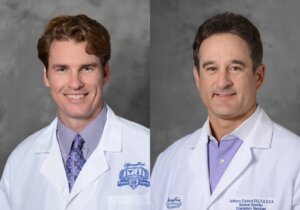

Dr. Jacob Manteuffel, Emergency Medicine Physician and Addiction Specialist, Director of Public Health at the Department of Emergency Medicine, Henry Ford Health Detroit Campus (left), and Dr. Anthony Colucci, Emergency Medicine Physician at the hospital’s Macomb Campus (right)
Attitudes toward people with opioid use disorder (OUD) and the medications to treat the disease have significantly changed over the last 20 years. In this dialogue, Dr. Jacob Manteuffel, Emergency Medicine Physician and Addiction Specialist, Director of Public Health at the Department of Emergency Medicine, Henry Ford Health Detroit Campus, and Dr. Anthony Colucci, Emergency Medicine Physician at the hospital’s Macomb Campus, reflect upon how their perceptions shifted throughout their work with OUD patients and the impact on the quality of care. Recognizing the emergency department’s (ED) role in providing equitable treatment for this population, Henry Ford Health was among the Community Foundation for Southeast Michigan’s first Michigan Opioid Partnership (MOP) grantees. The hospital used the funds to strengthen the medication for opioid use disorder (MOUD) services offered through the ED. Dr. Manteuffel is also a MOP Clinical Consultant.
Early Perceptions and Practices
Dr. Manteuffel
When I was in medical school and then starting residency, we used opioid medications for pain without a deep understanding of the source of pain or whether opioid medication was appropriate in each case. Even ten years ago, to be honest with you, when patients would come into the ED in opioid withdrawal, we wouldn’t have great options for them and I would say “Opioid withdrawal is not going to kill you. Here’s a number to call for help and maybe some clonidine or zofran. Have a great day. You’re discharged.”
And then, there started to be some momentum in the emergency space for buprenorphine, and I was unsure of the role of emergency medicine in the treatment of opioid use disorder. I was vice president of MCEP (Michigan College of Emergency Physicians) in 2015 or ‘16, and I was going to the national meetings every year. Physicians from New Mexico and California were talking about needing to give this (medication) to patients in the ED. I listened, but also thought, “You guys are crazy! We’re just going to attract all the addicts. Nobody wants that!”
Dr. Colucci
When I started practicing 34 years ago when people with substance abuse issues came into the department, you’d think, “How do I get rid of this person?” No one thought maybe they had some genetic predisposition. They made this choice, and shame on them.
Part of my addressing people who would come and request Dilaudid, Demerol, or Norco, you know, the typical thing we saw day-to-day, was to use MAPS (Michigan Automated Prescription System) to show the patient their prescription history. It’s like they got caught with their hand in a cookie jar because I knew what they were doing. I also used MAPS to have intelligent conversations about why it was malpractice for me to give them opiates because they’d developed a dependency. Another thing I did throughout my practice was I never prescribed more than 15 tablets. Colleagues said to give 30 with a couple of refills. I said patients don’t need it that long. I guess I was right because here we are today, limiting the amount of narcotics prescribed.
Evolving into Champions
Dr. Manteuffel
Over the last decade, my whole perspective has completely changed when it comes to opioid use disorder.
I started hearing some of the stats about the mortality numbers of these patients, especially in the fentanyl era. If somebody who comes into your ED overdosed, there’s anywhere between a 5 and 15 percent chance that they’ll die within a year. That’s right up there with trauma, sepsis, and STEMIs (ST-elevation myocardial infarction, a type of heart attack).
I got interested in MOUD, and I feel like it is in emergency medicine’s space because we want to help people—period. We want to save lives. That’s why we became ER docs. And so, it really is our space, and this is our acute opportunity to intervene because these are generally not people engaged with the healthcare system. And so that’s kind of how I try to sell it to my colleagues. This is a high mortality condition. We’re at Henry Ford! Sepsis is a high-mortality condition; we’re all over it. We should be all over this as well.
Dr. Colucci
FAN (Families Against Narcotics) made me aware of how bad it was in the community. We share the blame as physicians on the frontline. That was the start of my thinking, “Wow! There’s a big problem, and I’m glad I did what I did at the beginning of my practice.” It was the beginning of changing the landscape and culture of the ED in terms of limiting the number of tablets prescribed.
I remember giving a talk at one of the FAN meetings. Somebody asked me what I thought of Suboxone and the opiate issue. I said I would caution against trading one addiction for another. FAN’s founder was so offended! She took me aside; that was the first lecture I got about how Suboxone was helping people function. I still didn’t grab onto it until I started learning about MOUD, buprenorphine, and the X-waiver.
I became interested in the X-waiver because I wanted an alternative. You know how many times you work a weekend or holiday, and that tends to be when people with OUD show up in the department, and your hands are tied. The methadone clinic is closed. What do I do to help these patients?
A light bulb went off in my head during that education (for the X-waiver). Shame on me for what I was thinking! These patients, they’re screaming for help. And I think this (MOUD) is a good way to allow them to curb the dependency they’ve developed and let them function in society without being ostracized like we used to make them feel.
Dr. Manteuffel
I was listening to an emergency medicine doctor in New Mexico talk about becoming board certified in addiction medicine and starting a clinic in the community because there weren’t any other resources. At the time, I thought his ideas were out there and not a path I would want to follow. Sure enough though, in 2022, I became board certified in addiction medicine. It’s low-hanging fruit to help these patients. You can potentially change the course of someone’s life, and that’s rewarding.
People with OUD are so used to being stigmatized by themselves and the healthcare industry. And they are legitimately caught off guard when someone talks to them about their use and aims to help them in any way possible.
Even if you just say, “I understand you’re not ready to change, and that’s okay. We’re always here. We can help you because I don’t want you to die.”
Dr. Colucci
And first, do no harm. We’ve taken an oath to help these patients. And it doesn’t help when we have preconditioned or predetermined opinions about them when they come in. If you go into a room with a preconceived idea and attitude, you just did that person a disservice. I’ve tried over the years just to step back and give them the same fresh clean slate I’d give anybody else.
So, it’s been an education, a metamorphosis. That’s my story of the transition and how I became a butterfly.
Continuing the Journey
Dr. Colucci
I like where I’m at right now with my thinking. This (MOUD) is the right thing to do. Moving forward, we need to make the community and healthcare field aware that there’s a major opioid problem, then you can educate them. Trying to educate somebody about something they’re unaware of, we can’t move the needle. After that, you get engagement. I think that’s when you really move the needle, change the culture, change attitudes, and hopefully, change the whole epidemic by reducing the number of people who become fatal statistics.
Dr. Manteuffel
It’s interesting to me how widespread this issue is. It crosses all socio-economic borders. I think those who have means have more ability to be engaged in treatment, whereas a lot of our patients might not have, and we are the only ones that can help them. I’m dedicated to helping spread MOUD across the whole Henry Ford system, not just the Detroit campus. I want everyone to have a streamlined process that works for the doctors and the patients.
